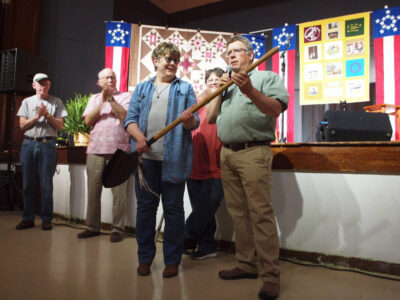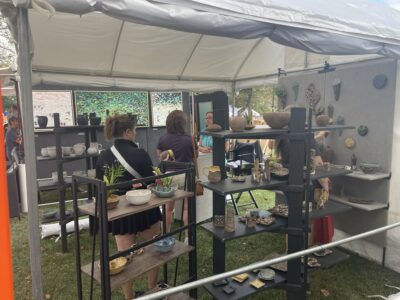Lawrence author’s empathy for human stories lands her that elusive book deal

photo by: Contributed
Lawrence author Amy Stuber
Lawrence author Amy Stuber has steadily published her short stories in magazines for years. Literary agents inquired, multiple manuscripts were sent out, but the book deal never came. Now, more than 30 years since her first short story was published, she’s out with her debut.
Stuber’s short story collection “Sad Growups,” published by Stillhouse Press, came out this month and includes 17 stories. For Stuber, 55, who first started writing in high school and went on to earn a PhD in English with a creative writing emphasis from the University of Kansas, it’s simply the continuation of something she has always done.

photo by: Contributed
The cover for Lawrence author Amy Stuber’s story collection “Sad Grownups.”
“Sure, I would have preferred to have it happen when I was 30,” Stuber said. “On the other hand, I like that it’s at this point in my life because I feel like it’s a reminder to people that there’s nothing that earth shattering about continuing your creative work your whole life. If it’s something you do, you’re probably going to always do it.”
Stuber, who grew up in the Kansas City area and initially moved to Lawrence to attend KU, published her first short story in 1993, and in the years since has published about 70 short stories, pieces of flash fiction and nonfiction in various literary magazines, journals and other publications. Her writing has appeared in The New England Review, Flash Fiction America, Ploughshares, The Idaho Review, Witness, The Common, The Cincinnati Review, Triquarterly, American Short Fiction, Joyland, Copper Nickel, West Branch and elsewhere. Despite that steady flow of publications, the book was slow to come.
Stuber said on a few occasions she was contacted by literary agents, but they always wanted to know if she had a novel — she didn’t. She sent manuscripts of short story collections out to publishers in the 1990s and early 2000s, and though she would sometimes get encouraging responses back, she never got one accepted. Then came life.
Following the birth of her children in 2005 and 2008, there was a period of several years when, occupied with her career in online education and raising young children, she published only a couple of stories. But when she ultimately returned her attention to fiction, she had a bit of a breakthrough. Stuber said she was spurred to get back into it when a couple of her stories were accepted at notable magazines, including a publication in The New England Review in 2015. In 2018, she also began working as a volunteer editor at Split Lip Magazine, where she found herself among a community of writers for the first time since graduate school.
“I had lost that writing group, and then after getting involved with Split Lip, I again had all these people who I shared work with,” Stuber said. “Reading their work was inspiring, and just the editing and reading the queue there really made me think a lot about how to build a story and pushed me in terms of my own experimentation.”
Publishing steadily again, her writing was getting noticed. Stuber won the 2021 Northwest Review Fiction Prize and was a runner-up for the 2022 CRAFT Short Fiction Prize. Her work received a special mention in Pushcart Prize XLIV and appeared in Best Small Fictions 2020 and 2023. Her story “The Last Summer” won The Missouri Review’s 2023 William Peden Prize.
The 2023 Peden Prize was judged by novelist Daphne Kalotay, author of the international bestseller “Russian Winter” and the collection “Calamity and Other Stories.” In the prize announcement, Kalotay describes Stuber’s story as “beautiful” and “unexpectedly humorous.” In “The Last Summer,” which is also included in Stuber’s collection, a terminally ill adjunct poetry professor befriends two college students who move into the adjoining apartment, leading to a surprising outing that brings him both joy and sobering clarity.
“Just as in real life, I love when fictional characters, too, surprise me — when (they) turn out to be more than the ‘type’ they’ve been pegged for, and their circumstances allow unpredictable relationships to form,” Kalotay wrote.
But the best news came later that same year from Stillhouse Press, which wanted to publish Stuber’s collection. Stuber launched “Sad Grownups” on Oct. 8 at The Raven Book Store in downtown Lawrence to a full crowd of friends, family and supporters. This past week, she traveled to New York to participate in a reading with other debuting short story authors, including Vincent Anioke, Janelle Bassett, Gina Chung and Lena Valencia.
At 55, Stuber is not the typical literary debutant. Her work has had decades to evolve, and she said some aspects about her writing have certainly changed. She said she writes less about her own experiences now than when she was younger and experiments more with structure. The result can be seen in the 17 stories in “Sad Grownups,” which are told with various perspectives, structures and cover a wide breadth of circumstances and situations.
“I think constantly trying to imagine the way other people experience the world is one of the most fun things about being a writer,” Stuber said.
The collection’s titular story, “Sad Grownups,” centers on two 19-year-old boys who make a reckless (and criminal) decision in an attempt to win the attention of a crush. The story “Little Women” moves through the perspectives of four young women cast as Meg, Jo, Beth and Amy as they live through a reality show modeled on the “influencer houses” of the social media era, but with an artificially created 19th century atmosphere. The story “Doctor Visit” cycles through three alternative versions of a family tragedy and a doomed love affair as the protagonist tries to arrive at a reality that makes sense.
Though the structures, plots and characters change, when asked what has remained the same over her many years of writing, Stuber said there is one aspect she hopes persists — and that’s an empathy for human stories.
“Someone who reviewed this book said that she thought it was really humane,” Stuber said. “And I would say that’s probably the biggest constant. I try to be empathic — I’ve not been at various times in my life — but trying to give a real sense of human emotion and write in a humane way is something I’ve tried to do consistently.”







